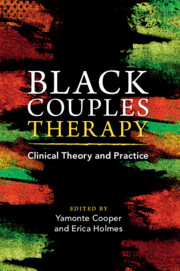Book contents
- Black Couples Therapy
- Black Couples Therapy
- Copyright page
- Contents
- Figures
- Tables
- Contributors
- Foreword
- Acknowledgments
- Introduction
- Part I Race, Racism, and Identity
- Chapter 1 Internalized Stereotypes and the Impact on Black Couples
- Chapter 2 The Role of the Strong Black Woman Schema in Black Love and Relationships
- Chapter 3 Black Same-Gender-Loving Male Couples’ Health within an Afrocentric Psychological Paradigm: The Influences of Spirituality and Religion
- Part II Foundations for Healthy Coupling
- Part III Adapting Major Therapeutic Approaches for Work with African American Couples
- Part IV Sex and Intimacy
- Part V Special Topics
- Index
- References
Chapter 2 - The Role of the Strong Black Woman Schema in Black Love and Relationships
from Part I - Race, Racism, and Identity
Published online by Cambridge University Press: 27 July 2023
- Black Couples Therapy
- Black Couples Therapy
- Copyright page
- Contents
- Figures
- Tables
- Contributors
- Foreword
- Acknowledgments
- Introduction
- Part I Race, Racism, and Identity
- Chapter 1 Internalized Stereotypes and the Impact on Black Couples
- Chapter 2 The Role of the Strong Black Woman Schema in Black Love and Relationships
- Chapter 3 Black Same-Gender-Loving Male Couples’ Health within an Afrocentric Psychological Paradigm: The Influences of Spirituality and Religion
- Part II Foundations for Healthy Coupling
- Part III Adapting Major Therapeutic Approaches for Work with African American Couples
- Part IV Sex and Intimacy
- Part V Special Topics
- Index
- References
Summary
The Strong Black Woman (SBW) schema exemplifies how many Black women are socialized to experience themselves in relationship to the world. The image of a strong Black woman is embodied by unyielding strength and unlimited capacity when navigating daily roles, interpersonal interactions, and life tasks. Examples include “Black women don’t cry in public” and “Black women have no choice but to be resilient.” Specifically, personifying the SBW schema can make it difficult for Black women to seek and engage in healthy romantic interpersonal relationships. This chapter reviews the history and development of the SBW schema and how this schema manifests in the lived experiences of Black women in romantic relationships. Understanding this context provides better comprehension of the challenges Black women may face when dating and developing healthy intimate partner attachments and can also provide more advantageous clinical insight when working with Black women clients in therapy.
- Type
- Chapter
- Information
- Black Couples TherapyClinical Theory and Practice, pp. 38 - 57Publisher: Cambridge University PressPrint publication year: 2023



